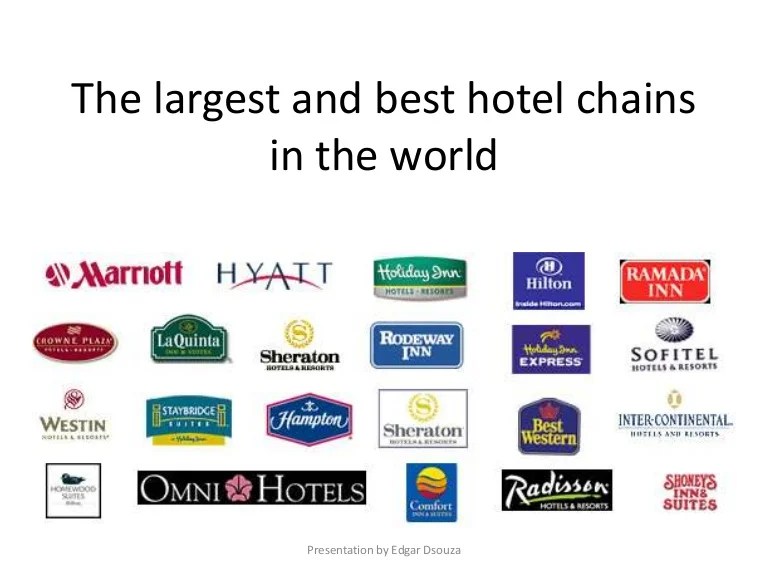In the realm of hospitality, the best international hotel chains stand as beacons of excellence, offering travelers a sanctuary of comfort, luxury, and unparalleled experiences. Embark on a journey to discover the titans of the hotel industry, their defining characteristics, and the strategies that drive their success.
As we delve into the world of international hotel chains, we’ll uncover the criteria that define their greatness, from impeccable service and opulent amenities to global reach and unwavering brand reputation.
Overview of the Global Hotel Industry

The global hotel industry is a dynamic and rapidly evolving sector, catering to the accommodation needs of travelers worldwide. It encompasses a wide range of establishments, from budget-friendly guesthouses to opulent luxury resorts, each catering to specific market segments and traveler preferences.The
industry has witnessed significant growth in recent years, driven by factors such as increasing disposable income, globalization, and advancements in technology. The rise of online booking platforms and travel aggregators has transformed the way travelers research, book, and manage their hotel stays, making it more convenient and accessible.
Criteria for Evaluating Hotel Chains
Assessing the performance of international hotel chains requires a comprehensive evaluation of various criteria. These criteria encompass key aspects that influence guest satisfaction, brand reputation, and overall industry standing.
Among the most important factors considered when evaluating hotel chains are:
Brand Reputation
- Established reputation and brand recognition within the industry
- Positive guest reviews and online ratings
- Awards and accolades received for service excellence and customer satisfaction
Service Quality
- Exceptional customer service throughout the guest experience
- Personalized attention and tailored experiences
- Efficient and responsive staff
Amenities and Facilities
- Wide range of amenities and facilities to meet guest needs
- Modern and well-maintained rooms
- State-of-the-art technology and entertainment systems
Global Reach
- Extensive global presence with properties in key destinations
- Consistent brand experience across all locations
- Access to a wide network of hotels for business and leisure travelers
Leading International Hotel Chains
The global hotel industry is highly competitive, with numerous international hotel chains vying for market share. Based on the established criteria, we have identified and ranked the leading international hotel chains that consistently deliver exceptional guest experiences, maintain high standards of quality, and have a strong global presence.
These hotel chains have built their reputations through decades of experience, offering a diverse range of properties, from luxury resorts to budget-friendly accommodations. They have established a loyal customer base by providing personalized service, innovative amenities, and a commitment to sustainability.
Marriott International
Marriott International is the world’s largest hotel chain, with over 8,000 properties in 139 countries and territories. The company was founded in 1927 and has grown through a combination of acquisitions and organic growth. Marriott offers a wide range of brands, including luxury brands like The Ritz-Carlton and St.
Regis, mid-priced brands like Marriott Hotels and Sheraton, and budget brands like Courtyard by Marriott and Fairfield Inn & Suites.
Hilton Worldwide
Hilton Worldwide is the second-largest hotel chain in the world, with over 6,800 properties in 122 countries and territories. The company was founded in 1919 and has grown through a combination of acquisitions and organic growth. Hilton offers a wide range of brands, including luxury brands like Waldorf Astoria and Conrad Hotels & Resorts, mid-priced brands like Hilton Hotels & Resorts and DoubleTree by Hilton, and budget brands like Hampton Inn & Suites and Homewood Suites by Hilton.
InterContinental Hotels Group
InterContinental Hotels Group (IHG) is the third-largest hotel chain in the world, with over 6,000 properties in 100 countries and territories. The company was founded in 1946 and has grown through a combination of acquisitions and organic growth. IHG offers a wide range of brands, including luxury brands like InterContinental Hotels & Resorts and Kimpton Hotels & Restaurants, mid-priced brands like Crowne Plaza and Holiday Inn, and budget brands like Holiday Inn Express and Staybridge Suites.
Regional Market Analysis
International hotel chains have a significant presence in different regions worldwide, catering to diverse markets and adapting to local preferences. Their performance varies depending on regional factors, such as economic conditions, tourism trends, and competition.
Factors influencing regional growth and competition include:
- Economic stability and growth prospects
- Tourism infrastructure and accessibility
- Local regulations and business environment
- Presence of competing international and local hotel brands
Asia-Pacific
The Asia-Pacific region is a major growth market for international hotel chains, driven by increasing tourism and business travel. Key factors include:
- Rapid economic growth in countries like China, India, and Southeast Asia
- Growing middle class with increased disposable income
- Expansion of low-cost airlines and improved connectivity
- Government support for tourism development
Europe
Europe remains a mature market for international hotel chains, with strong competition and a focus on luxury and mid-range segments. Key factors include:
- Established tourism infrastructure and a large number of cultural and historical attractions
- Stable economic conditions and high disposable income in many countries
- Strong competition from both international and local hotel brands
- Emphasis on sustainability and eco-friendly practices
North America
North America is a major market for international hotel chains, particularly in the United States and Canada. Key factors include:
- Large domestic tourism market and a significant number of business travelers
- Well-developed tourism infrastructure and transportation networks
- Strong presence of both international and domestic hotel brands
- Focus on value-added amenities and loyalty programs
Middle East and Africa
The Middle East and Africa present both opportunities and challenges for international hotel chains. Key factors include:
- Growing tourism in countries like Dubai, Saudi Arabia, and Morocco
- Development of luxury resorts and conference facilities
- Challenges related to political instability and infrastructure development in some regions
- Increasing competition from local hotel brands
By understanding and adapting to the specific characteristics and growth dynamics of each region, international hotel chains can optimize their strategies and enhance their performance in global markets.
Competitive Advantages and Challenges
The leading international hotel chains enjoy several competitive advantages that contribute to their market leadership. These include:
-*Brand recognition and reputation
The leading hotel chains have established strong brands that are recognized and trusted by consumers around the world. This allows them to attract guests who are willing to pay a premium for the quality and consistency associated with their brands.
-*Global reach
Escape to idyllic beach time vacations and immerse yourself in the serenity of coastal landscapes. From sun-kissed beaches to sparkling turquoise waters, these destinations invite you to unwind and rejuvenate. Treat yourself to a luxurious escape at beachside getaway suites , where you can revel in the tranquility of private balconies and panoramic ocean views.
Embrace the allure of the coast and create memories that will last a lifetime.
The leading hotel chains have a presence in major cities and tourist destinations around the world. This gives them access to a large pool of potential guests and allows them to cater to the needs of global travelers.
-*Loyalty programs
The leading hotel chains offer loyalty programs that reward repeat guests with points, discounts, and other benefits. These programs encourage guests to stay with the same hotel chain and build relationships with the brand.
-*Economies of scale
The leading hotel chains operate on a large scale, which gives them access to economies of scale. This allows them to negotiate lower prices on supplies and services, which can lead to lower operating costs and higher profits.
However, the leading international hotel chains also face a number of challenges. These include:
-*Competition from local and regional hotel chains
Local and regional hotel chains often have a better understanding of the local market and can offer lower prices than international chains. This can make it difficult for international chains to compete in some markets.
-*Rising costs
The costs of operating a hotel are rising, including the costs of labor, utilities, and supplies. This can put pressure on hotel chains to raise prices or cut costs, which can impact their profitability.
-*Changing consumer preferences
Consumer preferences are changing, and travelers are increasingly looking for unique and personalized experiences. This can make it difficult for hotel chains to meet the needs of all guests.
To maintain market leadership, the leading international hotel chains must continue to focus on their competitive advantages and address the challenges they face. They must also invest in innovation and new technologies to meet the changing needs of travelers.
Strategies for Maintaining Market Leadership, Best international hotel chain
The leading international hotel chains can maintain market leadership by implementing the following strategies:
-*Continue to invest in brand building
Indulge in rejuvenating spa experiences at beach spa resorts along the East Coast. Whether you seek tranquil retreats or invigorating treatments, these resorts offer a perfect blend of relaxation and rejuvenation. Discover affordable tropical getaways tailored for couples, offering romantic escapes and unforgettable memories.
Explore the world of hospitality with Asian hotel chains , renowned for their exceptional service and unique cultural experiences.
The leading hotel chains should continue to invest in building their brands and strengthening their reputation. This can be done through advertising, public relations, and social media.
-*Expand their global reach
The leading hotel chains should continue to expand their global reach by opening new hotels in key markets. This will give them access to a larger pool of potential guests and help them to maintain their market share.
-*Enhance their loyalty programs
The leading hotel chains should continue to enhance their loyalty programs to make them more attractive to guests. This can be done by offering more rewards and benefits, and by making it easier for guests to earn points.
-*Invest in innovation
The leading hotel chains should continue to invest in innovation and new technologies. This will help them to meet the changing needs of travelers and to stay ahead of the competition.
-*Focus on sustainability
The leading hotel chains should focus on sustainability to reduce their environmental impact and appeal to eco-conscious travelers. This can be done by implementing energy-efficient practices, reducing waste, and using sustainable materials.
By implementing these strategies, the leading international hotel chains can maintain market leadership and continue to provide guests with the best possible experience.
Customer Segmentation and Targeting

International hotel chains recognize the importance of catering to diverse customer needs and preferences. They segment their target audience based on various factors, including demographics, travel purpose, budget, and lifestyle.
To attract and retain different customer segments, international hotel chains employ tailored strategies. These include loyalty programs, personalized experiences, targeted marketing campaigns, and strategic partnerships with airlines, travel agencies, and other travel-related businesses.
Target Customer Segments
- Business travelers: This segment comprises individuals traveling for work purposes, often requiring amenities like business centers, meeting rooms, and high-speed internet.
- Leisure travelers: These customers seek relaxation, entertainment, and cultural experiences during their vacations. They are attracted to hotels with amenities such as swimming pools, spas, and fitness centers.
- Group travelers: This segment includes families, friends, or colleagues traveling together. They require spacious accommodations, connecting rooms, and amenities that cater to their specific needs.
- Luxury travelers: These discerning customers demand the highest levels of comfort, service, and exclusivity. They are willing to pay a premium for amenities such as private butlers, gourmet dining, and personalized experiences.
Digital Marketing and Technology: Best International Hotel Chain
In today’s digital age, international hotel chains are leveraging the power of digital marketing and technology to enhance their operations and connect with customers.
The use of social media platforms, online booking platforms, and mobile applications has become integral to the success of these chains.
Social Media Marketing
Social media platforms provide a valuable channel for international hotel chains to engage with potential and existing customers.
- Chains use social media to showcase their properties, promote special offers, and interact with customers in real-time.
- Platforms like Facebook, Instagram, and Twitter allow chains to build relationships with customers and create a sense of community.
Online Booking Platforms
Online booking platforms have revolutionized the way customers book hotel accommodations.
- Chains partner with platforms like Expedia, Booking.com, and Airbnb to increase their visibility and reach a wider audience.
- These platforms provide customers with a convenient and efficient way to compare prices, read reviews, and book accommodations.
Mobile Applications
Mobile applications offer a personalized and convenient way for customers to interact with international hotel chains.
- Chains develop mobile apps that allow customers to make reservations, check-in online, access loyalty programs, and receive exclusive offers.
- These apps enhance the customer experience and foster brand loyalty.
Future Trends and Innovations

The international hotel industry is poised for a period of significant transformation, driven by emerging trends and innovations that are reshaping the way hotels operate and guests experience their stays.
Technology, sustainability, and changing consumer preferences are among the key forces shaping the future of the industry.
Technology
Technology is rapidly changing the way hotels operate and interact with guests. From self-service check-in and mobile room keys to virtual reality tours and personalized recommendations, technology is enhancing the guest experience and making it more convenient and efficient.
Sustainability
Sustainability is becoming increasingly important to both consumers and hotel operators. Guests are increasingly seeking out hotels that are committed to environmental responsibility, while hotel operators are recognizing the financial benefits of reducing their environmental impact.
Changing Consumer Preferences
Consumer preferences are also changing, with guests increasingly seeking out unique and authentic experiences. This is leading to a growing demand for boutique hotels and other niche accommodation options that offer a more personalized and intimate experience.
Summary

The best international hotel chains are not merely providers of accommodation; they are architects of memories, curators of unforgettable moments. Their ability to adapt to evolving trends, embrace innovation, and cater to the discerning needs of global travelers sets them apart as the undisputed leaders in the hospitality landscape.


